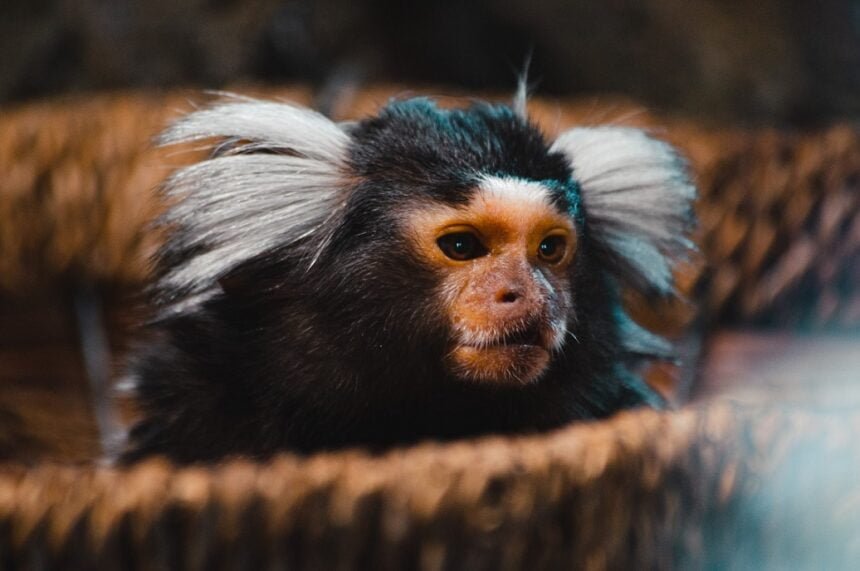Monkeys as pets can be captivating and entertaining, but they require specialized care. These intelligent creatures thrive in their natural habitat, and domestication poses challenges. They demand a significant amount of time, space, and attention. Moreover, their complex social needs and long lifespans make them unsuitable for most households. Responsible research is crucial before considering such an endeavor. When it comes to keeping monkeys as pets, it’s important to understand that not all monkey species are suitable or legal to own as pets. However, under certain conditions, you can keep some smaller monkey species as pets.
Types of pet monkeys
Capuchin Monkeys:

Capuchin monkeys, known for their expressive faces and dexterous hands, are among the most commonly kept monkey species. Their small size and ability to learn complex tasks make them appealing to some individuals. Capuchins require a lot of attention, socialization, and mental stimulation to thrive. Their high intelligence enables them to undergo training for performing simple tasks and providing assistance to individuals with disabilities. However, their care can be demanding, and they need a specialized environment to ensure their well-being.
Marmosets Monkeys:

Marmosets are tiny primates with endearing appearances and playful personalities. Their small size makes them more manageable in terms of space requirements compared to larger monkey species. Marmosets are highly social animals and should ideally be kept in pairs or small groups to ensure their emotional well-being. Their diet consists of a varied mix of fruits, vegetables, and insects, requiring careful attention to nutritional needs.
Squirrel Monkeys:

Squirrel monkeys are known for their lively nature and sociability. They are highly active and require ample space for climbing, exploring, and playing. Due to their social nature, squirrel monkeys do best when kept in groups. These monkeys have a varied diet consisting of fruits, vegetables, and protein sources such as insects or small amounts of lean meat. Proper diet and a stimulating environment are crucial for their health and happiness.
Tamarins Monkeys:

Tamarins, small primates, are known for their distinctive appearance, sporting long, fine hair and impressive mustaches. Like other monkey species, they are highly social and thrive when kept with companions of their own kind. Tamarins have specific dietary needs, including insects, fruits, and specialized primate pellets. They also require enclosures that allow them to climb and jump freely.
Spider Monkeys:

Spider monkeys use their long limbs and prehensile tails for locomotion and hanging from trees, making them known for these distinctive features. They are highly intelligent and require ample space to climb and swing. Spider monkeys are highly social animals and thrive when they have companions of their own species. Due to their active nature, they need regular physical exercise and mental stimulation. To ensure the well-being of spider monkeys, owners must carefully meet their nutritional needs by providing a specialized diet consisting of fruits, vegetables, nuts, and seeds.
Pet Monkey Ownership Guidelines
Legality and Regulations: Research and comply with local laws and regulations regarding pet monkeys. Some areas prohibit the ownership of primates, while others require permits or licenses.
Ethical Considerations: It’s important to consider the welfare and conservation of the species before deciding to keep a monkey as a pet. Many primate species have complex social, behavioral, and environmental needs that may be challenging to meet in a domestic setting.
Socialization and Companionship: Monkeys are highly social animals and require ample social interaction and companionship. It is recommended to provide them with plenty of mental stimulation, engage in play, and spend quality time bonding with them.
Enrichment and Environment: Monkeys need a stimulating and enriching environment that mimics their natural habitat. Provide them with opportunities for climbing, swinging, and exploring. Offer toys, puzzles, and activities that engage their intelligence and curiosity.
Specialized Veterinary Care: Find a veterinarian with experience in primate medicine who can provide routine check-ups, vaccinations, and specialized care when needed. Regular veterinary visits are essential to monitor their health and well-being.
The Costs of Owning a Pet Monkey
Initial purchase cost: The price of a pet monkey varies depending on the species, age, and availability. Some species can be extremely expensive, ranging from several thousand dollars to tens of thousands of dollars.
Enclosure and supplies: Monkeys require a large and secure enclosure with ample space for climbing, playing, and exploring. The cost of constructing or purchasing an appropriate enclosure can be substantial. Additionally, you’ll need to invest in bedding, perches, toys, feeding bowls, and other supplies.
Veterinary care: Regular veterinary check-ups, vaccinations, and preventive treatments are essential to ensure the health and well-being of your monkey. Primate veterinarians may charge higher fees for their specialized services compared to regular veterinarians.
Diet and nutrition: Monkeys have specific dietary requirements, which can include a variety of fresh fruits, vegetables, specialized primate pellets, and, depending on the species, even insects or small amounts of meat. Providing a nutritious and balanced diet for your monkey can be costly.
Enrichment and toys: Monkeys are highly intelligent and require mental stimulation to prevent boredom and promote their well-being. You’ll need to invest in toys, puzzles, and other enrichment items to keep them engaged and entertained.
Training and socialization: Proper training and socialization are crucial for pet monkeys. Depending on their species and individual needs, you may need to enroll them in training classes or seek the assistance of professional animal trainers, which can incur additional costs.
Licensing and permits: In areas where owning a monkey is legal, there may be licensing or permit requirements imposed by local authorities. These permits may have associated fees and renewal costs.
Liability insurance: Some regions may require liability insurance coverage for owning a pet monkey. This insurance is intended to protect against potential damages or injuries caused by the monkey.
Conclusion
Monkeys have complex needs and may not thrive in domestic settings, leading to significant ethical concerns. It is important to thoroughly research the specific species, their care requirements, and legal regulations before considering a monkey as a pet. It is often more appropriate and responsible to appreciate these remarkable creatures in their natural habitats or support conservation efforts aimed at protecting them.







